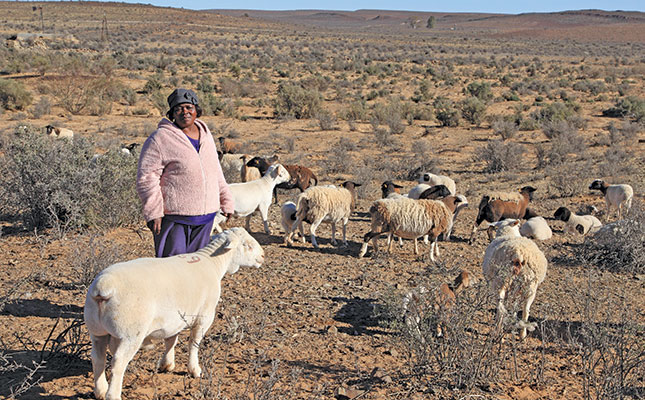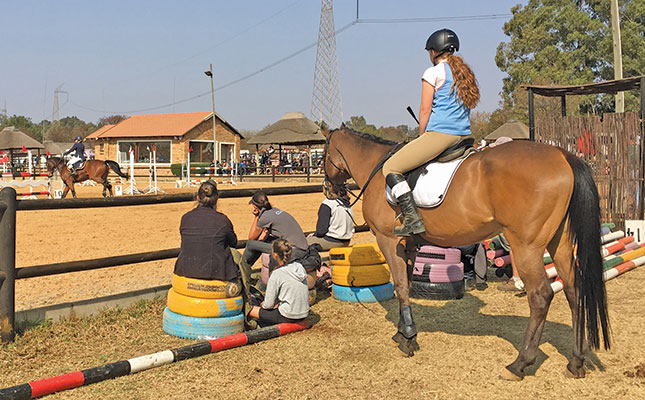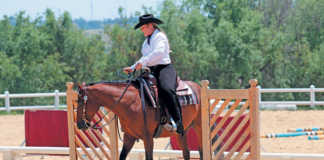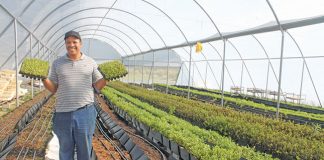
Photo: Wouter Kriel
Emily Kok, who is originally from Williston in the Karoo, returned to live there in 2012 after working in Cape Town for 30 years.
“There aren’t many job opportunities in Williston, so I decided to become a sheep farmer. I joined the Amandelboom Small Farmers’ Group and bought six ewes to start with. But in Williston you need at least 10 animals to qualify for land on the commonage, so I bought another eight ewes.”
READ Sheep farming: the best ways to reduce lamb losses
Kok also applied for land on Verjaarsfontein, a government farm 35km from Williston. Her timing was fortunate. Not long after she started out on the commonage, six of her lambs were stolen, but this was followed by the good news that her application had been successful. She lost no time in relocating to Verjaarsfontein, where she was allocated a 174ha camp and permitted to keep 60 animals.
“Coming from Cape Town, I had no farming experience, but I made a point of attending training courses hosted by the [then Department of Agriculture, Forestry and Fisheries], and I asked other farmers for advice. I learnt a lot, but still made many mistakes along the way,” says Kok.
Initially, for example, she experienced problems with young ewes that struggled to lamb.Unsure of what to do, she asked for help from an experienced farmer, who showed her how to help the ewes during lambing season.
“Another mistake I made at the beginning was to give the ewes lamb creep feed as a supplement. But this product is meant to help lambs grow after birth. My mistake resulted in the lambs being too big at birth, and many died in the process.”
Learning about rams
“I also had a lot to learn about rams and how they can make or break a farming business,” Kok recalls.
Her first animal was not particularly productive, and as a result many of her ewes failed to conceive.
By 2020, her flock had grown to around 100 ewes and two rams, but many of the ewes were still not producing lambs. She has since learnt, however, that at least two rams are needed for every 50 ewes.
READ Painted Persian sheep demand a handsome profit
“With only two rams [in total], they might end up fighting one another and forgetting about the ewes. With more rams, those that want to fight can fight, while the others can attend to the ewes! So I currently have five rams.”
In 2020, Kok received a ram from Coetzee Reitz, manager of the Williston Meat Co-operative. Ewes mated to this ram have already produced two sets of twins this year, and almost all of Kok’s ewes have lambed this season.
Challenges
In Kok’s opinion, farming in the Williston area is by no means easy. “The drought [we’ve had here] since 2015 is very challenging for us. There are also more diseases amongst the animals, as their condition isn’t that good. I sell the ram lambs to be able to afford feed, but I have to keep my ewe lambs, otherwise I’d be going backwards. We’ve received government drought aid since 2015, and I also buy feed from the co-operative here in town. At this stage, the veld is completely bare, and the animals are dependent on being fed.”
READ Droughts: a global crisis that hits the poorest
Kok says she is also fortunate to have the support of Reitz who, from time to time, helps her with her feed expenses.
Another challenge is the relationship between the 11 farmers on Verjaarsfontein, which Kok describes as tense. She says that people are jealous of one another, and it is difficult to reach agreement on decisions that affect all of the farmers, such as the maintenance of the camps, the water infrastructure and general security.
Kok gives the houses and buildings on the farm as an example. There is only one shed for the farmers to store their feed, and the other shed, which government built a few years back, has been completely stripped and is now useless. The workers’ houses are standing empty, as is the main farmhouse, which is in a state of disrepair.
“If we could work together as a group, the main house can be converted into a guest house or rented out for someone to stay in. Now it’s just empty and falling apart,” she says.
Kok adds that the producers are only able to get three-year leases on the farm, an issue which they have taken up with officials, who had promised them five-year contracts. So far, however, they have not received any response.
“Ideally, they should be nine-year-and-11-month leases [the maximum length of a short-term lease], as this would give us access to additional government support.”
Kok is in a difficult situation because, as her herd continues to grow, she is quickly running out of space to accommodate the animals.
“My camp is restricted to 60 animals, but I currently have 106. I’ll be writing to the municipality to request additional land, and
I’ve applied to the department [of agriculture] for an allocation on another land reform farm in our area. There’s extra land available on the commonage, but animal theft is a real problem there, as it’s too close to town.’’
Passion and perseverance
Kok attributes her business success to the love she has developed for farming, and her commitment to it. She adds that the carcass competitions have taught her what a good lamb should look like.
“My awareness of an animal’s condition has improved a lot because of the competitions. If I see a lamb that’s struggling, I’ll remove it from the ewe and give it special attention to bring it back to health.”
Hard work, but worth it
She encourages those interested in farming to take a leap of faith, but admits that it is a great deal of hard work. “Be prepared to learn a lot, too, and don’t be afraid to ask advice from the [experienced farmers] in your area.”
She adds that you also need to persevere and not give up when things get tough. Kok’s dream is to have her own farm, but says that in order to qualify for one from government, she would need a flock of 300. “This is a tough situation to be in, as I need more land to increase my herd from the current 106 [head] to 300.”
She has applied for land at De Riet, another government-owned farm, and is hopeful that she will be accommodated there.
“According to the officials I’ve spoken to, if you can manage your herd on De Riet, you can qualify for your own farm.”
Phone Emily Kok on 078 227 9306.











